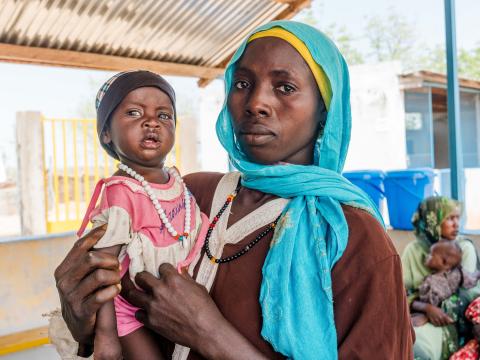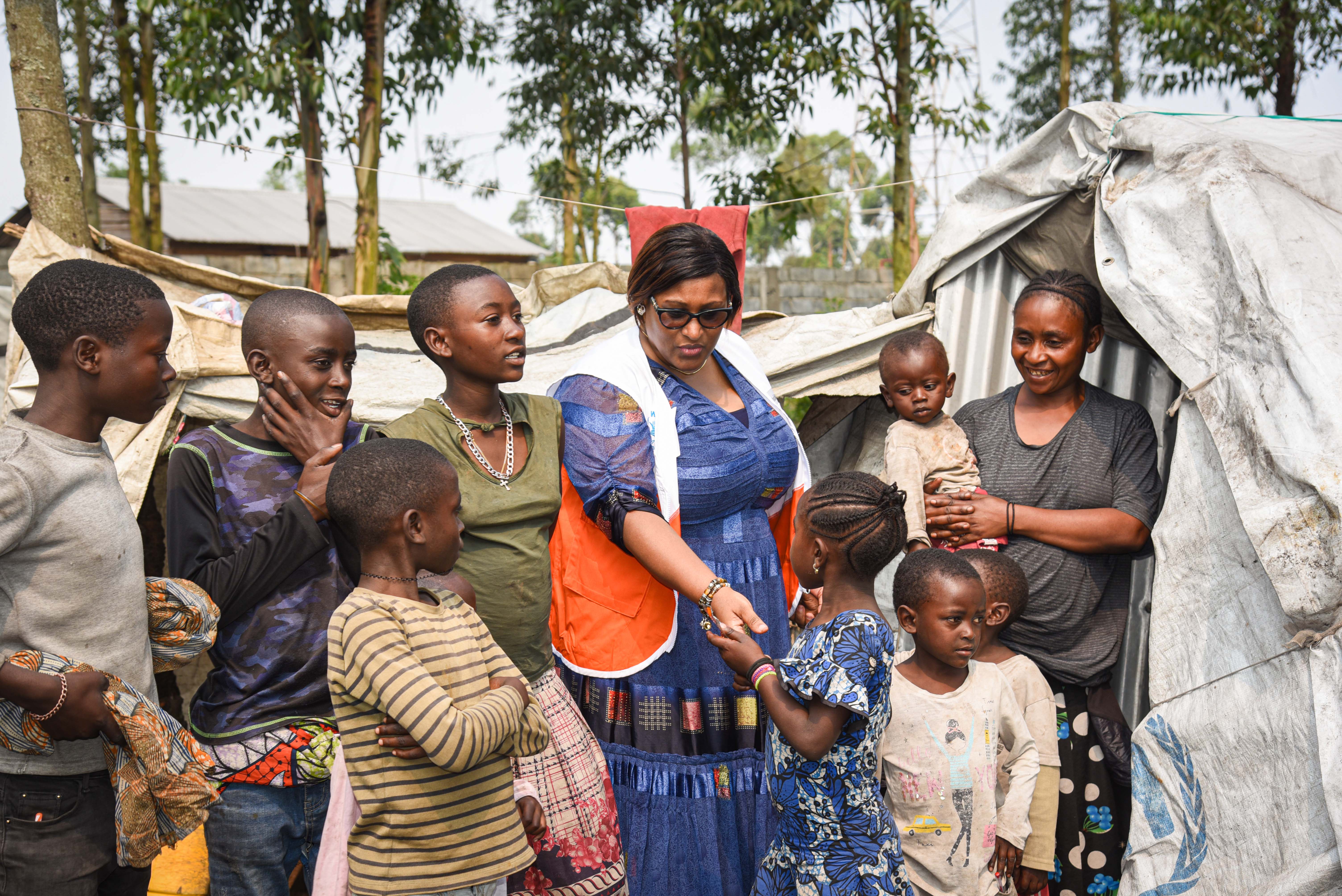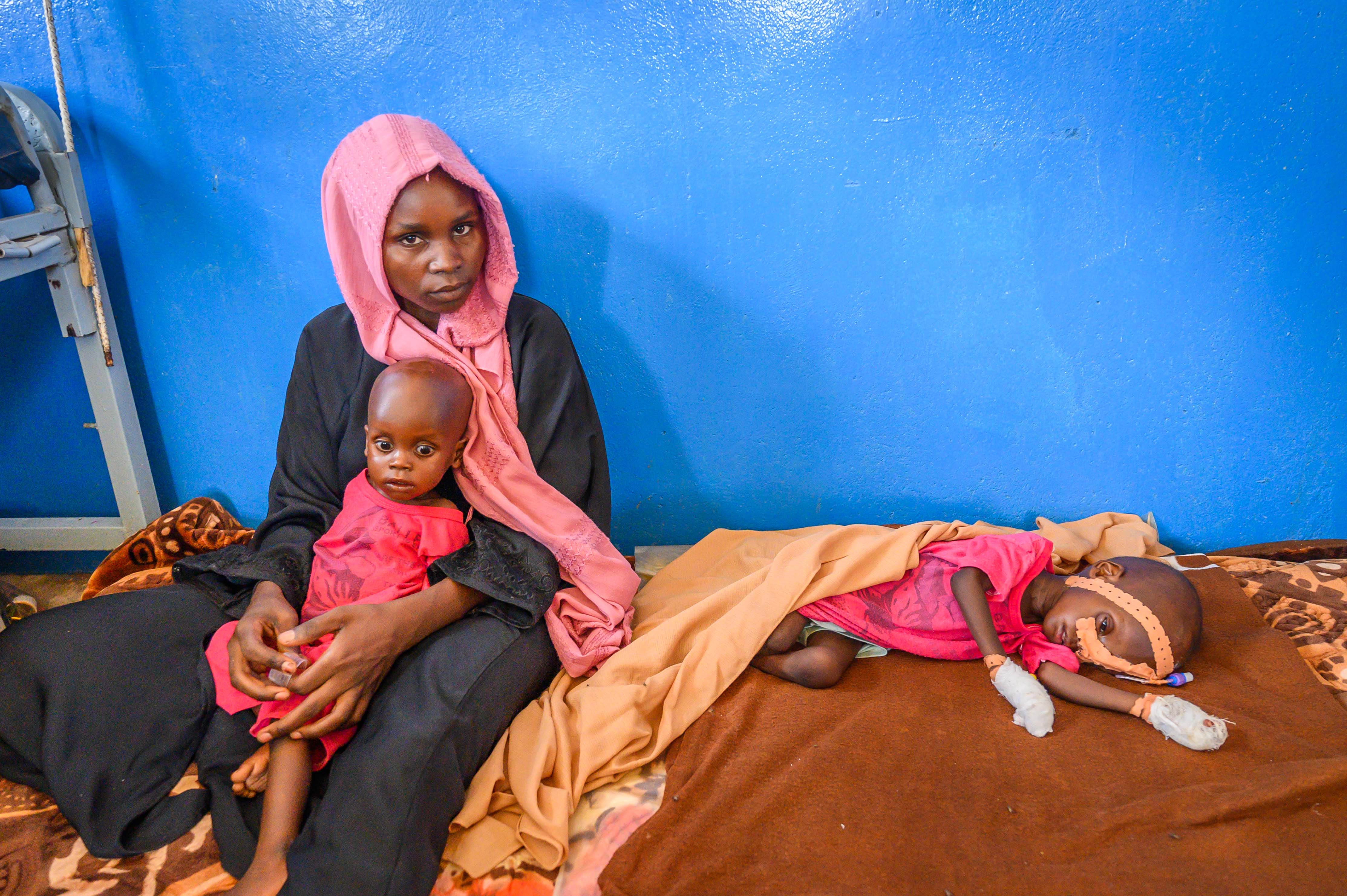It takes a coalition to combat conflict & hunger

Afisa is a mother of eleven children, the youngest cradled in her arms as she sits outside her small shelter. Two years ago, she fled her village of Kingi in Masisi territory, seeking safety in Bulengo camp outside of Goma DRC. There, she and her family relied on food distributions from World Vision and its partners to survive. But when the conflict intensified, Afisa was forced to flee again. The camp residents were given just 72 hours to leave. With no other option, she gathered her children and ran, eventually finding refuge in a cramped, makeshift shelter. Afisa’s greatest challenge now is hunger. She and her children have gone days without eating. “Sometimes, we just drink water to fill our stomachs,” she says quietly. Her voice trembles as she speaks of the future. “If things continue like this, hunger will kill us before anything else.” Afisa’s situation is precarious. She lives in constant fear of being forced to leave again, with nowhere else to go. Her story is a stark reminder of people running from conflict and trapped by hunger.

The number of people facing, or projected to face, famine-like conditions more than doubled from 705,000 in five countries/territories in 2023 to 1.9 million in four countries/territories in 2024. Conflict is the major driver of acute food insecurity and malnutrition, intersecting with extreme weather events and compounded by structural weaknesses. The impact on children and communities is devastating. In 2018, the landmark Resolution 2417 condemned the use of starvation as a weapon of war, created an important framework to prevent and protect civilians from conflict-induced hunger and highlighted the need for early action to address situations where civilians are at risk. And yet, seven years since the international community united to adopt UNSCR 2417, hunger is still being used as a weapon of war in many contexts. Civilians are deliberately cut off from aid. Farms are burned. Markets are bombed. And children go to bed hungry not because food is not available but because violence keeps it from reaching them.
To challenge this situation, in 2024 World Vision and eight other civil society organisations founded the Coalition Against Conflict and Hunger, to turn the tide on conflict-induced hunger by committing to working on the prohibition of starvation as a weapon of war, the protection of civilians and the humanitarian space in conflict contexts. Civil Society organisations like World Vision can play a key part in sharing contextually relevant information on conflict-induced hunger through engaging with local communities, which is key to understanding their unique needs and perspectives as well as encouraging the active participation and ownership of affected groups in decision-making processes.
Under our capacity as steering committee member of the coalition against conflict and hunger we work closely with UN agencies like WFP, FAO on issues related food and hunger related issues.
As a founding member of the Coalition, WV has actively contributed to joint advocacy statements and public and private country-specific advocacy, driven by the most urgent crises worldwide. For example, the Coalition statement and call to action in Sudan where, since hostilities broke out in April 2023, people have been caught in a conflict of major proportions. This has deeply exacerbated the pre-existing hunger and child malnutrition crisis and displaced 8.6 million people within the country. Today, over 25 million people, which is half of Sudan’s population, are trapped in a spiral of deteriorating food security, violence and displacement, in need of humanitarian assistance and protection.

In the context of Sudan, World Vision and Coalition members are urging all parties to the conflict to take immediate measures to prevent the escalation of the hunger crisis, which include not targeting, looting or incidentally damaging sites or infrastructure vital to food systems such as markets, land used for agriculture or livestock. They are calling for unfettered access to the most vulnerable population, to ensure a response scale-up driven by the humanitarian needs. They are reminding the international community to urgently increase funding. This is what UNSCR 2417 is about.
At the heart of the Coalition agenda is ultimately a desire to protect civilians, with a broad range of opportunities taken up at the local, regional, and global levels to decrease the frequency and intensity of conflict-induced hunger – the use of food as weapon in a new age of starvation- a trend that is becoming the new norm. A key upcoming advocacy opportunity for the Coalition is the Protection of Civilians Week (19-23 May), coordinated by UNOCHA, with Member States, UN agencies, NGOs, and affected communities sharing ideas and advance solutions to better protect civilians in armed conflict. At the margins of this year’s open debate, World Vision is co-sponsoring the side-event "Fact or Fiction on Conflict & Hunger: Exploring Evidence-based Drivers, Impacts and Tools". The event offers a critical opportunity to reflect upon how parties to conflicts create or perpetuate conflict-induced hunger and explore relevant tools, strategies, national legislation, policies and practices available to better protect civilians from conflict-induced hunger. Emphasis will be placed on the role of international humanitarian law and international human rights law in mitigating these impacts and ensuring compliance with established legal frameworks.
Conflict-induced hunger is not inevitable. It is a deliberate violation of international norms! This is why it takes deliberate, coordinated, and courageous action to stop it. The Coalition against Conflict and Hunger exemplifies how multilateral cooperation and humanitarian diplomacy strategies work jointly to protect civilians and their livelihoods and prevent the use of violence against food security in a systematic and context-specific manner. It also demonstrates the central role of civil society in connecting realities to global decision-making spaces.
This is not just about policy, it’s about people. It is about Arifa running from conflict and trapped by hunger. About a mother in Khartoum who cannot feed her children because her street is under siege. About a teenage girl in the DRC who risks sexual violence just to gather firewood for cooking.
As a child-focused organisation, World Vision will continue to advocate for every child’s right to life, dignity, and proper nourishment and to make sure that starvation is no longer used as a weapon of war.
About UNSCR 2417
Resolution 2417 calls upon all parties engaged in armed conflict to uphold their obligations under international law and condemns the use of starvation as a weapon of warfare, as well as the obstruction of humanitarian aid and the denial and destruction of resources essential for civilian survival. The resolution also mandates the Secretary-General to promptly report on emerging risks of conflict-induced famine and widespread food insecurity and to provide updates on the implementation of Resolution 2417 in the annual Protection of Civilians report submitted to the Security Council. Moreover, it encourages all States to engage with and influence parties to the conflict, and to remind them of their obligation to comply with IHL. It also calls for States to conduct independent, full, prompt, impartial and effective investigations within their jurisdiction into violations of international humanitarian law related to the use of starvation of civilians as a method of warfare.